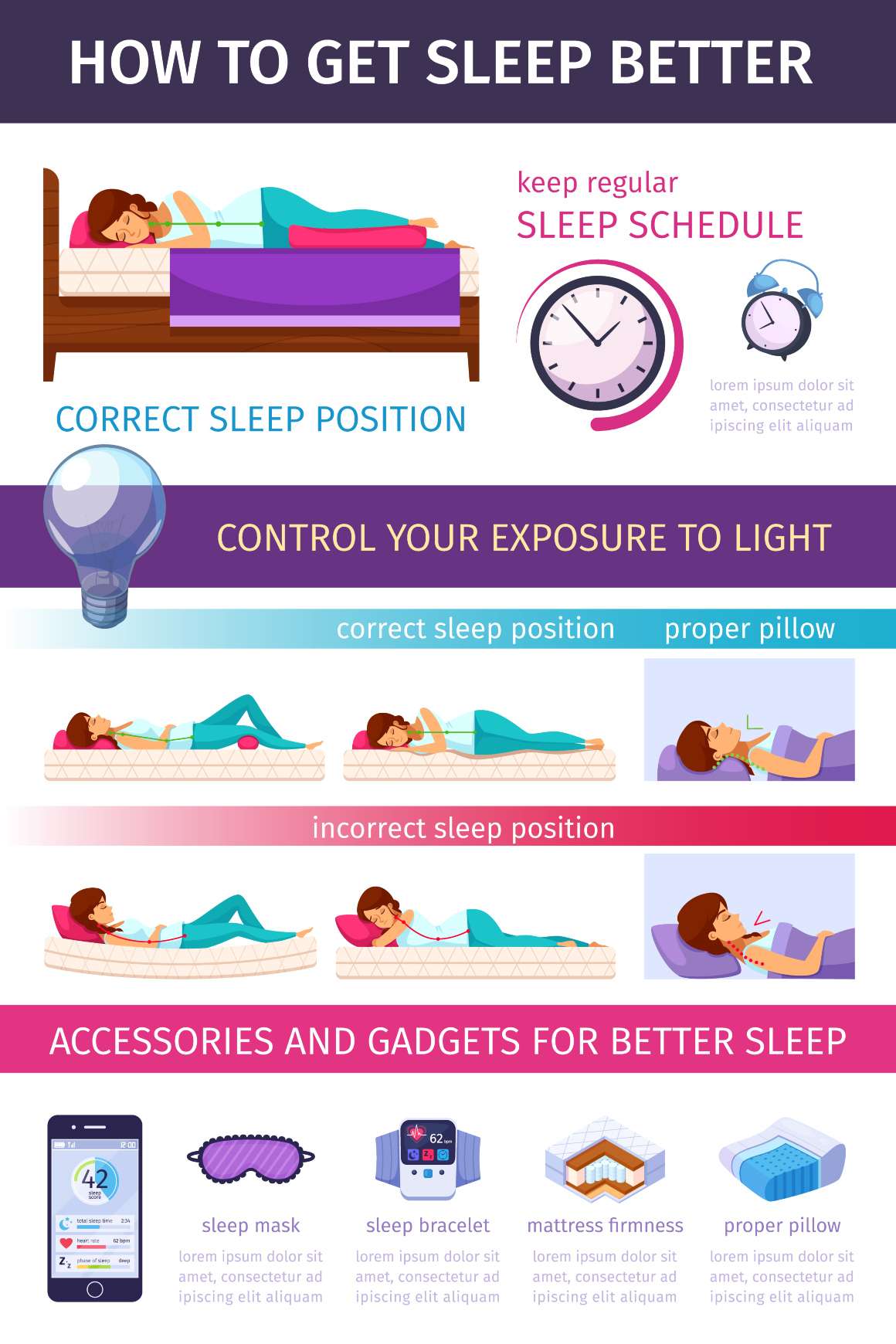How to Fix your Sleep Schedule?
Published:
Manage Light Exposure for Better Sleep
Your internal clock, or circadian rhythm, responds to external cues like light levels which influence your sleep-wake patterns. By managing your exposure to light throughout the day, you can help reset your internal clock and improve your sleep schedule.
Contents:
- Manage Light Exposure for Better Sleep
- Exercise Regularly to Improve Sleep Schedule
- Create a Relaxing Bedtime Routine
- Optimize Sleeping Conditions
- Consistency is Key - Stick To Set Times
- Coping with Jet Lag and Time Zone Changes
- Establish Proper Sleep Hygiene Practices
- Fixing Sleep Schedules for Babies, Toddlers, and Pets
- FAQs in Relation to How to Fix Sleep Schedule
- Conclusion
Importance of Natural Sunlight Exposure
Getting some sunlight during the day is essential for maintaining a healthy sleep schedule. Melatonin production, which is key to our sleep-wake cycle regulation, can be regulated by sunlight exposure. Aim for at least 30 minutes of natural sunlight exposure daily by taking walks outside or opening curtains and blinds to let daylight into your living spaces.

Effects of Artificial Light on Sleep
In contrast to natural light, artificial illumination from gadgets such as phones, tablets and computers emits blue radiation which can disturb our circadian rhythm by decreasing melatonin production. This interference with our internal body clock may lead to irregular sleep schedules and lower-quality sleep.
- Avoid screens before bedtime: To minimize this effect on your sleeping habits, try avoiding screen time at least one hour before going to bed.
- Create a relaxing atmosphere: Turn off or dim bright lights in the evening leading up to bedtime. Consider using warm-toned bulbs or lamps instead of cool-toned ones as they emit less blue light.
- Leverage technology: Many devices now offer features like "night mode" which reduces blue-light emissions; enable these settings to help protect your sleep schedule.
Managing the amount of light, be it from natural or artificial sources, can help you maintain a regular sleep cycle and get more restful sleep. This, in turn, will help fix any irregularities in your sleep schedule for a more consistent and restful night's slumber.
Exercise Regularly to Improve Sleep Schedule
Establishing a regular exercise routine is crucial for maintaining a healthy sleep schedule. Physical activity helps regulate your sleep cycle, ensuring you get the recommended hours of high-quality sleep each night. Exercise can also alleviate stress and anxiety, which are common causes of disrupted sleep patterns.
Benefits of Regular Exercise for Better Sleep Quality
- Improved Circadian Rhythm: Engaging in physical activities during daylight hours strengthens your body's circadian rhythm, making it easier to fall asleep at night and wake up feeling refreshed in the morning.
- Better Mood: Exercise releases endorphins that help improve mood and reduce feelings of stress or anxiety, leading to more restful nights.
- Increase Deep Sleep: Studies have shown that people who exercise regularly experience an increase in deep sleep stages, essential for physical recovery and overall well-being.
Best Time for Workouts and Their Impact on Sleep
Finding the right time to work out can significantly impact your ability to fall asleep quickly and stay asleep throughout the night. While exercising earlier in the day is generally considered best for promoting good sleeping habits, individual preferences may vary. Here are some guidelines on when to engage in physical activities:
- Morning Workouts: A workout first thing after waking up jumpstarts your metabolism while exposing you to natural sunlight—both factors contributing positively towards regulating your internal body clock.
- Late Afternoon/Early Evening: This period allows enough time between exercise sessions and bedtime, ensuring your body temperature and heart rate have returned to normal levels before you hit the sack.
- Avoid Late-Night Workouts: Exercising too close to bedtime can increase alertness and make it difficult for you to fall asleep. Aim to finish exercising at least two hours before going to bed.
For optimal results, a regular exercise regimen is essential for improving sleep and overall health. However, remember that consistency is key—maintaining a consistent workout schedule will yield better results in terms of sleep quality than sporadic sessions.

Create a Relaxing Bedtime Routine
A relaxing bedtime routine is essential for signaling to your body that it's time for rest and improving your sleep hygiene. By incorporating winding down activities such as reading or taking a warm bath, you can reduce stress and anxiety associated with disrupted sleep schedules. This will ultimately help you fall asleep quickly and stay asleep throughout the night.
Winding Down Activities Before Bed
- Reading: Engaging in light reading before bed helps relax the mind and prepare it for sleep. Choose books or articles that are not too stimulating to avoid keeping yourself awake.
- Taking a Warm Bath: A warm bath can help lower your body temperature, which signals to your internal body clock that it's time to wind down. Add some Epsom salts or lavender oil for an extra soothing experience.
- Meditation: Practicing mindfulness meditation has been shown to improve sleep quality by reducing stress levels. Try guided meditations specifically designed for better sleep (Headspace, for example).
- Gentle Stretching: Gentle stretches can help release tension from muscles, allowing you to feel more relaxed before bed. Focus on areas like the neck, shoulders, back, and hips where tension tends to accumulate during day-to-day activities.
The Role of Relaxation Techniques in Improving Sleep
Incorporating relaxation techniques into your bedtime routine can have significant benefits when trying to fix irregular sleep schedule issues caused by factors such as jet lag, shift work-related disruptions, and other sleep issues. These methods include:
- Progressive Muscle Relaxation: This technique involves tensing and relaxing different muscle groups in a specific order. It helps to release tension throughout the body, promoting relaxation and better sleep.
- Breathing Exercises: Deep breathing exercises like the 4-7-8 method can help calm your nervous system, making it easier for you to fall asleep. Inhale for four seconds, hold your breath for seven, exhale for eight, and repeat several times until you feel more relaxed and ready to drift off into dreamland.
- Aromatherapy: Using essential oils such as lavender or chamomile has been shown to promote relaxation and improve sleep quality (source). Diffuse them in your bedroom before bedtime to enjoy the calming effects they provide.
Incorporating these activities and techniques into your nightly routine will not only help you fix your sleep schedule but also contribute to achieving high-quality sleep consistently over time.
Optimize Sleeping Conditions
To improve your sleep schedule, it is essential to create a comfortable and conducive environment for rest. A good night's rest can be greatly affected by various elements, including the mattress and pillow type, room temperature, sound levels and even pre-bedtime consumption.
Choosing the Right Mattress and Pillow Types
The foundation of a good night's sleep starts with choosing the right mattress that suits your body type and sleeping preferences. The same goes for selecting an appropriate pillow type. Both should provide adequate support while ensuring comfort throughout the night. Investing in high-quality bedding materials will not only enhance your overall sleeping experience but also help prevent common issues like neck pain or lower back discomfort.

How Room Temperature Affects Your Ability to Fall Asleep
Maintaining an ideal room temperature is essential for falling asleep quickly and achieving a good night's rest. According to research by The American Physiological Society, cooler temperatures promote better sleep quality as they facilitate natural drops in core body temperature during nighttime hours. To achieve this ideal environment, consider using air conditioning systems, fans, or space heaters depending on individual needs/preferences.
In addition to optimizing physical conditions within bedroom spaces themselves, practicing proper "sleep hygiene" habits is equally important. Addressing potential disruptions caused by consuming caffeinated beverages or alcohol close to bedtime and avoiding these substances at least 4-6 hours prior to retiring helps ensure uninterrupted, higher-quality rest periods.
Creating a quiet and peaceful sleeping environment is also essential for improving your sleep schedule. If you live in a noisy area or have trouble blocking out sounds, consider using white noise machines or earplugs to minimize disturbances during the night. To further support your circadian rhythm and encourage restful sleep, limit exposure to bright lights in the evening.
To sum up, optimizing your sleeping conditions by investing in quality mattresses, pillows, and bedding materials; creating quiet surroundings using white noise machines or earplugs; maintaining optimal room temperature through air conditioning systems, fans, or space heaters; and avoiding caffeinated beverages or alcohol consumption prior to bedtime can significantly improve both the quality of your sleep and your ability to maintain a consistent sleep schedule.
Consistency is Key - Stick To Set Times
Maintaining a consistent sleep schedule is crucial for improving your overall sleep quality and regulating your body's circadian rhythm. Going to bed and waking up at the same time each day, even on days off, can help develop good habits and better sync your internal clock with external cues such as daylight.
Importance of Consistent Sleep and Wake-Up Times
A regular sleep schedule helps synchronize your internal body clock with external cues like daylight hours. This synchronization makes it easier for you to fall asleep quickly, stay asleep throughout the night, and wake up feeling refreshed in the morning. Moreover, having a regular bedtime routine reduces instances of insomnia or other sleep disorders that may arise from an irregular sleep pattern.
Gradually Adjusting Your Sleep Schedule
If you need to change your current sleeping hours, do so gradually by adjusting them in small increments (15-30 minutes) until you reach your desired bedtime or wake-up hour. Making sudden changes might disrupt your circadian rhythm further and lead to lower-quality sleep or difficulty falling asleep.
- Create a regular schedule: Determine what times work best for both bedtime and waking up based on personal preferences as well as professional commitments.
- Avoid naps: If possible, refrain from taking long naps during the day as they can interfere with nighttime restfulness (source). Short power naps lasting no more than 20 minutes are acceptable if necessary.
- Resist the snooze button: Hitting the snooze button can disrupt your sleep cycle and make it harder to wake up at a consistent time. Consider setting an alarm clock without a snooze feature or placing it across the room, so you have to get out of bed to turn it off.
Incorporating these strategies into your daily routine will help you establish and maintain a consistent sleep schedule, ultimately leading to better sleep quality and overall well-being. Remember that consistency is key when trying to fix your sleeping habits, so stay committed even if progress seems slow initially.

Coping with Jet Lag and Time Zone Changes
When attempting to fix a sleep schedule, it's essential to consider the impact of jet lag and time zone changes. Typically, your body takes about one day per time zone to adjust. However, individuals with conditions like Delayed Sleep Phase Syndrome (DSPS) may require up to two weeks to get back on track.
Strategies for Overcoming Jet Lag
- Fasting: One effective strategy is fasting before your flight. This helps reset your internal clock by signaling that it's time for a new eating pattern when you arrive at your destination. For more information on how fasting can help combat jet lag, check out this study.
- Melatonin Supplements: Taking melatonin supplements can also be beneficial in regulating sleep cycles and resetting internal clocks. Melatonin is a hormone naturally produced by the body that plays an essential role in controlling our circadian rhythms. When traveling across different time zones or dealing with chronic insomnia or jet lag disorders like DSPS, taking melatonin supplements might prove helpful.
- Sleep Schedule Adjustment: Gradually adjusting your sleep schedule before departure can make adapting easier once you reach your destination. Start going to bed earlier or later depending on whether you're flying eastward or westward.
The Role of Fasting and Melatonin in Adapting to New Time Zones
Fasting and melatonin supplements can work together to help your body adapt more quickly to new time zones. Fasting helps reset your internal body clock by signaling that it's time for a new eating pattern, while melatonin assists in regulating sleep cycles.
Not everyone will have the same reaction to fasting or taking melatonin supplements, so it's important to consider factors such as age, overall health, and individual circadian rhythms before trying either. Factors such as age, overall health, and individual circadian rhythms can impact how effective these strategies are for you. Consult with a healthcare professional before trying any new supplement or dietary changes.
In conclusion, coping with jet lag and time zone changes can be challenging, but with the right strategies, you can minimize the impact on your sleep schedule and overall well-being. By fasting, taking melatonin supplements, and gradually adjusting your sleep schedule, you can help your body adapt to new time zones and get the high-quality sleep you need to feel your best.
Establish Proper Sleep Hygiene Practices
Practicing proper sleep hygiene ensures that your bedroom environment is conducive to promoting relaxation and free from distractions. To achieve this, it's essential to remove work-related items and electronic devices that emit blue light, which can suppress melatonin production and negatively impact sleep quality and duration. Instead, create designated spaces outside the bedroom to unwind and engage in leisurely pursuits.
Creating a Clutter-Free Sleeping Space
A clutter-free sleeping space not only looks more inviting but also helps you mentally prepare for rest. Consider implementing these tips:
- Maintain a clean room by regularly washing bed linens, vacuuming floors, and dusting surfaces.
- Organize personal belongings using storage solutions like shelves or under-bed containers.
- Remove any objects unrelated to sleep (e.g., laptops or exercise equipment) from the bedroom area.
Limiting Exposure to Screens Before Bedtime
The blue light emitted by screens on smartphones, tablets, computers, televisions can interfere with your body's circadian rhythm by suppressing melatonin production - the hormone responsible for regulating sleep-wake cycles. To minimize exposure before bedtime:
- Create a screen-free zone in your bedroom; avoid using electronic devices at least one hour before going to bed (source) . li >
- If you must use screens close to bedtime , consider wearing blue-light-blocking glasses or installing apps that filter out blue light on your devices (source) . li >
- Engage in relaxing activities like reading a physical book, journaling , or practicing mindfulness meditation to help your mind and body prepare for sleep.
To maximize your sleep quality, build a daily routine that includes the right sleep hygiene habits and creates an atmosphere conducive to relaxation. Establishing a tranquil atmosphere and limiting disturbances can assist you in drifting off promptly, getting an uninterrupted slumber, and rising feeling rejuvenated each day.

Fixing Sleep Schedules for Babies, Toddlers, and Pets
Learn how different techniques can be applied when fixing the sleep schedules of babies, toddlers, as well as pets such as cats or dogs. Understand their unique needs and adopt appropriate strategies tailored specifically towards them.
How to Fix a Baby's Sleep Schedule
To help your baby establish a regular sleep schedule, create a consistent bedtime routine that includes calming activities like reading stories or singing lullabies. Make sure the nursery is dark and quiet during naptime and nighttime to encourage better sleep quality. If your baby wakes up in the middle of the night, keep interactions brief and soothing so they learn to associate nighttime with sleeping.
- Create a consistent bedtime routine
- Ensure proper sleeping conditions in the nursery
- Avoid stimulating activities before bed
- Maintain brief interactions during nighttime awakenings
How to Fix a 2-Year-Old's Sleep Schedule
Toddlers require consistency just like infants do; however, they may also benefit from having more control over their bedtime routines. Allow your toddler some autonomy by letting them choose which pajamas they want to wear or what book you'll read together at night. Be firm about sticking to set times for naps and bedtimes while gradually adjusting these if necessary.
- Incorporate choice into bedtime routines for increased autonomy
- Stick to set times for naps and bedtimes
How to Fix a Pet's Sleep Schedule
To help regulate your pet's sleep schedule, establish a consistent daily routine that includes regular feeding times, play sessions, and walks (for dogs). Keep their sleeping area comfortable and free of distractions. For cats specifically, engage in interactive play before bedtime to tire them out; for dogs, ensure they get plenty of exercise during the day but avoid overly stimulating activities close to bedtime.
- Establish a consistent daily routine
- Create a comfortable sleeping environment
- Engage in interactive play before bedtime for cats
- Ensure dogs get plenty of exercise but avoid stimulating activities close to bedtime
FAQs in Relation to How to Fix Sleep Schedule
What is the most effective way to fix your sleep schedule?
The most effective way to fix your sleep schedule includes exposure to natural sunlight, regular exercise, establishing a relaxing bedtime routine, optimizing sleeping conditions, and maintaining consistent bedtimes and wake-up times. Additionally, adjusting to new time zones and seeking professional help if necessary can also be beneficial. Sleep Foundation provides comprehensive tips on improving sleep habits.
How do I force my sleep schedule to fix?
To force your sleep schedule back on track, gradually adjust bedtime and wake-up times by 15-30 minutes daily until you reach the desired timing. Ensure consistency in this process while incorporating healthy habits like getting enough daylight exposure during daytime hours, engaging in physical activity regularly, creating a calming pre-sleep routine,limiting blue light exposure, and making sure your bedroom environment promotes restful slumber.
Is it OK to pull an all-nighter to fix sleep schedule?
Pulling an all-nighter is not recommended as a method for fixing one's sleep schedule because it can lead to increased fatigue and impaired cognitive function the following day. Instead of staying awake throughout the night,gradually shifting bedtime over several days or using melatonin supplements under medical supervision are safer alternatives for resetting circadian rhythms.
Conclusion
In conclusion, fixing your sleep schedule requires a combination of factors such as natural light exposure, regular exercise, establishing a relaxing bedtime routine, optimizing sleeping conditions, maintaining consistency in bedtimes and wake-up times, and seeking professional help if necessary. These tips can improve the quality of your sleep and promote better overall health.
If you're struggling with how to fix your sleep schedule or experiencing persistent challenges with insomnia or other related issues, consider reaching out to a healthcare professional for assistance. With their guidance and support, you can develop an effective plan that works best for you.













